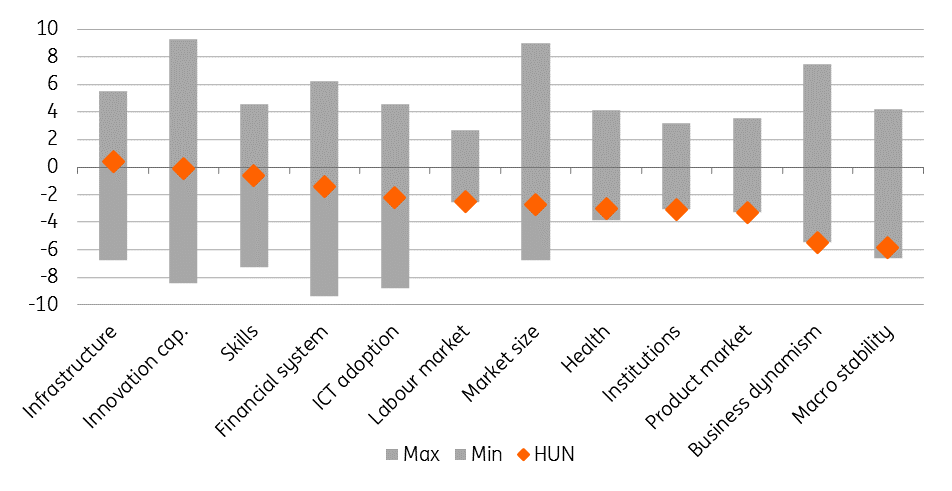Hungary ranked fifth…from last in EU competitiveness ranks
The World Economic Forum has released its latest Competitiveness Report and Hungary has few reasons to cheer, as it lags behind regional peers
| 48th |
Global Competitiveness Index rankin 2018 |
Hungary makes some progress but....
The World Economic Forum’s Global Competiveness Report 2018 ranked Hungary as the 48th most competitive country in the world (140 countries), with a score of 64.3 points (on a scale from 0 to 100), meaning that we are just above the world’s median (60 points). Although we’ve made progress from last year’s rankings (60th place in 2017), this is mainly due to a new methodology. Against this backdrop, the recent results are not comparable to the previous versions of the report.
The new Global Competitiveness Index, called GCI 4.0, tries to capture the determinants of long-term growth in a mostly digitised world. The new index is still based on 12 pillars, but now these are classified into four larger categories: Enabling Environment, Markets, Human Capital and Innovation Ecosystem. Thus, some countries, where competitiveness was mainly based on natural resources or a cheap and unskilled workforce were pushed back in this new list compared to the previous methodology.
As for Hungary's performance, 48th place looks reasonable at first sight, but it still places the country in 24th place within the EU, just beating Bulgaria, Romania, Greece and Croatia. Hungary is doing well in the Infrastructure pillar and in Innovation capacities, while Macro stability, Market size and Skills are in line with Hungary’s overall ranking. But the good news ends there.
Hungary's rankings in the 12 pillars

Strong criticism
The latest report strongly criticises judicial independence, the defence of property rights, high bureaucracy, corruption, organised crime and low social capital. These factors are putting Hungary’s Institutions well below its own total and the EU average in score and rank. Hungary also has issues with business dynamism, especially when it comes to the growth of innovative companies, and its high dependence on a cheap labour force. The tight labour market also reduces the country's competitiveness, according to the report. Our ranking in the indicator “ease of finding skilled employees” is 138th from the overall 140, reflecting the historically tight labour market. The Health pillar also paints a gloomy picture in the long term, with Hungary placing 69th. Healthy life expectancy, which captures the number of years a newborn can expect to live in good health, is just 65.8 years.
Hungary's competitiveness in the CEE space

No quick fix
Overall, it is really hard to find a silver lining in the report. Unfortunately, the factors which led to Hungary's competitive disadvantage within the European Union are those which can’t be changed overnight (e.g. health, skills, business dynamism). If Hungary doesn't take significant steps to improve soon, we are destined to fall further behind.
This publication has been prepared by ING solely for information purposes irrespective of a particular user's means, financial situation or investment objectives. The information does not constitute investment recommendation, and nor is it investment, legal or tax advice or an offer or solicitation to purchase or sell any financial instrument. Read more
